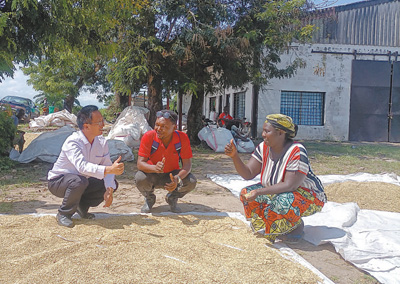Chinese hybrid rice planting boosts Burundi's efforts to reduce poverty

Chinese agricultural experts in Burundi share the joy of rice harvest with local villagers as a bountiful harvest of hybrid rice was achieved in the poverty reduction demonstration village, Lukaramu Farming Area, Bujumbura, Burundi.
Agriculture is the backbone industry of Burundi. Since 2009, the Chinese government has consecutively dispatched six groups of senior agricultural experts to Burundi for agricultural assistance. The China-Burundi agricultural cooperation has made substantial contributions to helping Burundi achieve food security and poverty reduction.
In 2018, the Chinese agricultural expert team initiated the first hybrid rice planting demonstration program in Ninga village of Kihanga, Bubanza province, Burundi. Providing funding and technical guidance, incubating technological talents from educated young villagers, and training farmers in local cooperatives, the program assisted 1,072 villagers of 134 households in growing hybrid rice. Today, with a 136-percent increase in the rice yield per hectare and an annual per capita grain possession of over 900 kilograms, Ninga village has been lifted out of poverty.
So far, the Chinese agricultural expert team has built 36 such demonstration villages as Ninga in Burundi and plans to build 20 more in the future.
"We firmly believe that hybrid rice planting will lead villagers on a path out of poverty and toward prosperity," said Yang Huade, head of the Chinese agricultural expert team dispatched to aid Burundi.
Evrard Ndayikeje, director general of the National Agency for the Promotion and Regulation of Cooperative Societies in Burundi, expressed deep gratitude for the mentorship provided by the Chinese agricultural expert team. "They completely changed my life," he said.
A few years ago, Ndayikeje was still a new graduate looking for a job. But things changed in 2016 when he was chosen by the Chinese expert team to become an agricultural technician trainee. There, he started learning the rice planting techniques and management from the Chinese experts. Now he has become an expert in promoting hybrid rice technology and a national role model for entrepreneurship. Due to his outstanding performance, Ndayikeje was recruited to the government and is a now a high-ranking official, for which he will be forever indebted to the Chinese expert team, he said.
Yang said the expert team has been nurturing local young talents in hybrid rice planting over the years, adding that the cultivation of local agricultural talents has played a crucial role in the development of Burundi's agriculture alongside the help of the Chinese expert team.
In 2023 alone, the Chinese expert team trained 48 young technicians, 3,600 villagers and 450 college students in Burundi.
Ndayikeje spoke highly of the long-term assistance of the Chinese expert team to Burundi, emphasizing that hybrid rice planting has become a very effective way to help reduce poverty in his country.
He also stressed Burundi’s willingness to continue deepening agricultural cooperation with China, in a bid to realize the country’s vision of attaining food self-sufficiency, eliminating poverty and becoming prosperous.
The sixth group of Chinese agricultural experts has begun their three-year work in Burundi this year. Among them, Yang has been stationed in Burundi since the third-phase assistance program, alongside some other members who had participated in assistance programs in other African countries before being dispatched to Burundi.
In May 2022, Burundian President Evariste Ndayishimiye presented a certificate of honor to Yang for his outstanding contribution to the development of Burundi's agriculture, saying that the Chinese agricultural expert teams have successfully increased Burundi's rice yield from an average of 3 tons per hectare to 10 tons, achieving a leap in growth.
Now 59 and approaching retirement, Yang said that he still hopes to continue serving in Burundi. "Based on our current work, the hybridization rate of rice in Burundi will reach 70 percent in three years, which means the country will basically achieve food self-sufficiency by then," said Yang, filled with confidence.

Follow us on WeChat
京ICP备18041594号-1
京公网安备 11010202005508号

Follow us on WeChat


